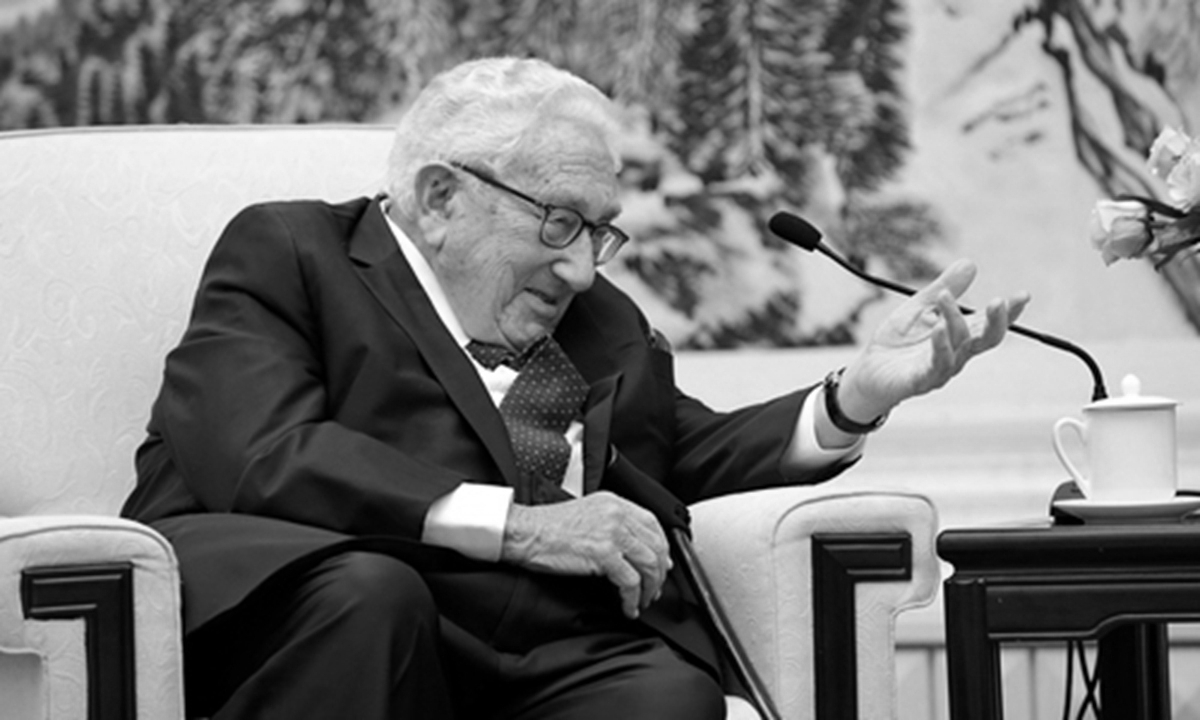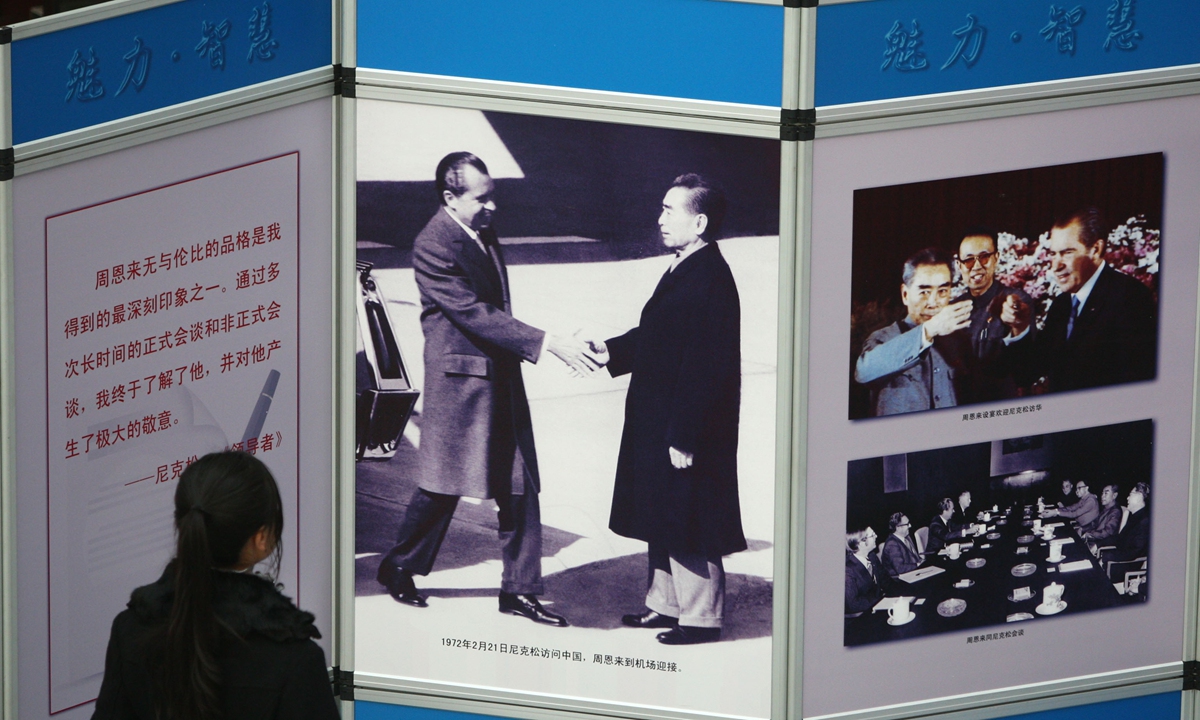
Henry Kissinger File Photo: VCG
Chinese President Xi Jinping on Thursday extended condolences over the passing of Henry Kissinger, former US Secretary of State and an important figure in the icebreaking between China and the US in 1972, at the age of 100.
According to the Xinhua News Agency, Xi sent a message of condolences to US President Joe Biden over the death of Kissinger. On behalf of the Chinese government and people, and in his own name, Xi extended profound condolences and expressed sincere sympathy to Kissinger's family. In his message, Xi said Kissinger was a world-renowned strategist and an old friend and good friend of the Chinese people. Half a century ago, with an outstanding strategic vision, Kissinger made historic contributions to the normalization of China-US relations, which has not only benefited the two countries, but also changed the world, Xi said.
Kissinger had made it his lifelong pursuit to promote the development of China-US relations and enhance the friendship between the two peoples, and his name will always be associated with China-US relations, Xi said.
Noting that Kissinger will always be remembered and missed by the Chinese people, Xi said that China is ready to work with the United States to carry forward the cause of friendship between the two peoples and promote the sound and steady development of China-US relations, so as to benefit the two peoples and make due contribution to world peace and development, Xinhua reported.
Kissinger Associates, Inc, a political consulting firm he founded, confirmed in a statement on Wednesday that Kissinger passed away at home in Connecticut.
As National Security Advisor and then Secretary of State during the Nixon and Ford Administrations, Dr. Kissinger "played central roles in the opening to China, negotiating the end of the Yom Kippur War in the Middle East, and helping to bring America's role in the Vietnam War to a close," said the statement.
The word "China" appeared 11 times in the statement, fully demonstrating how Kissinger's career became intertwined with the interactions between the world's two major powers, which have gone through ups and downs.
Kissinger made a secret China trip in 1971 which laid the foundation for president Nixon's historic China visit the following year,and the eventual normalization of China-US relations.

An exhibition on US President Richard Nixon's visit to China Photo: cnsphoto
Since then, the Germany-born American diplomat visited China more than 100 times
, the latest in July 2023. In his last visit, Xi told Kissinger that "We never forget our old friends, nor your historic contributions to promoting the growth of China-US relations and enhancing friendship between the two peoples."
Xie Feng, Chinese Ambassador to the US, on Thursday wrote on X, formerly Twitter, that Kissinger's death is "a tremendous loss for both our countries and the world. The history will remember what the centenarian had contributed to China-US relations, and he will always remain alive in the hearts of the Chinese people as a most valued old friend."
Hua Chunying, Assistant Minister of Foreign Affairs and a Foreign Ministry spokesperson, wrote on X that "His historic efforts to open & build constructive relations with China will always be remembered. His vision & wisdom will continue to inspire people across the Pacific & around the world."
As a familiar name to many Chinese people, Kissinger's death also became a hot topic of discussion on Chinese social media on Thursday. Many Chinese people mourned the loss of a wise mind, and expressed their appreciation for his contribution to China-US relations, which are considered the most important relationship in the current world.
Chinese Foreign Ministry spokesperson Wang Wenbin called Kissinger a dear old friend of the Chinese people and a trail-blazer and contributor to China-US relations. He will be greatly missed and fondly remembered by the people of China for his personal commitment and extraordinary contribution to China-US relations, Wang said at Thursday's routine press briefing, calling on both China and the US to carry forward Dr. Kissinger's strategic vision, political courage and diplomatic wisdom and, as President Xi and President Biden agreed in San Francisco, uphold the principle of mutual respect, peaceful co-existence and win-win cooperation and work to deliver a healthy, stable and sustainable China-US relationship.
Diplomatic legacy Kissinger was a controversial diplomat, but for Chinese people, he represented an era of China-US engagement when American policymakers had the vision and courage to overcome ideological barriers and make the right choice in line with the historical trend, analysts said.
During the Cold War and for years after that, Kissinger served as an important and also authoritative window for American policymakers and public to understand China through an objective and realistic lens. He was also one of the few American strategists who maintained a clear mind when China and the US entered a phase of greater competition, according to Li Haidong, a professor at the China Foreign Affairs University.
When China-US competition has become white-hot in recent years, Kissinger spared no efforts in calling for strategic prudence against the danger of war.
At an October event, Kissinger noted the two countries had a "unique ability to bring peace and progress to the world" and a "unique ability to destroy the world if not together." He advised Washington to avoid "giving an impression that we are walking away from the one-China policy," according to media reports.
Kissinger's approach in handling China-US relations turned out to be a rational and pragmatic one, even though he was criticized by some at home for his stance toward China.
But he was "being friendly" for US interests, Lü Xiang, a US studies research fellow at the Chinese Academy of Social Sciences, told the Global Times on Thursday, adding that it would be incorrect to say Kissinger had no ideological bias, but he was able to let strategic wisdom override that bias.
Lü attributed that to his unique background of being born in the 1920s and surviving WWII, in comparison to most American policymakers today who grew up through the Cold War under a strong ideological shadow.
Many Chinese mourned Kissinger not only for his personal contribution to China-US relations, but also lamented the passing of an era in which the US had sharp minds on foreign policy and dealt with China out of its realistic needs.
The US losing one finger and China losing two is not a win for the US, but a loss for both, Lü said in a metaphor referring to the consequences of the US' irrational China policy.
Gao Zhikai, vice president of the think tank Center for China and Globalization who interacted with Kissinger in 1980s, told the Global Times on Thursday that Kissinger's spirit for balance, for realism, for pragmatism… for the good of the American people, should continue and should continue to guide statesmen and politicians in the US.
Thomas A. Schwartz, a historian and author of Kissinger's biography, told the Global Times on Thursday that
the best way to commemorate Henry Kissinger is to remember the importance of diplomacy and the need for great powers to act responsibly and soberly in their relations with each other.
Both China and the US should inherit and carry forward Kissinger's strategic vision, political courage, and diplomatic wisdom, but although this former US diplomat was given a high-profile tribute in China, Chinese observers are worried over how much of his legacy can be preserved and practiced on the other side of the Pacific.





